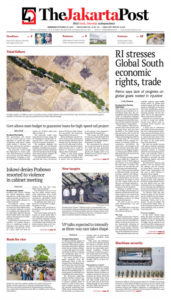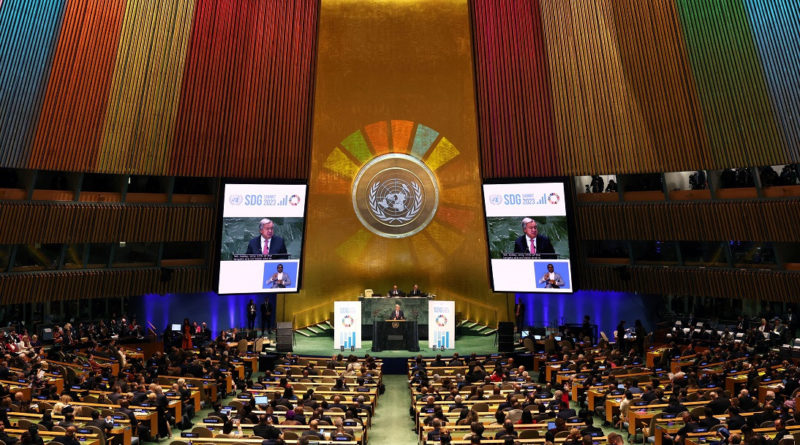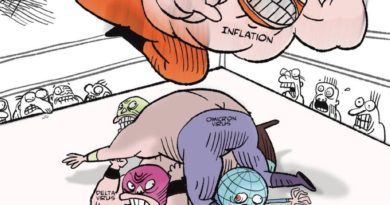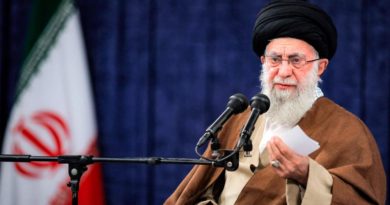HEADLINE | Indonesia pushes for downstreaming, Global South rights at UN SDGs summit
United Nations Secretary-General Antonio Guterres delivers a statement on Sept. 18, 2023, during the opening of the Sustainable Development Goals (SDGs) Summit 2023, at the UN headquarters in New York City, the United States. (Reuters/Mike Segar)
.
.

With much of its long-term development plan hindered by international trade laws, the current global order has been labeled “unfit” by Indonesian delegates at the United Nations Sustainable Development Goals (SDGs) Summit, who also urged for the end of “discriminatory” trade policies.
These repeated calls from Indonesia came as the country tries to escape from what has been described as the middle-income trap, and amid a bid to enter the Organization for Economic Cooperation and Development (OECD).
Ahead of the 78th UN General Assembly (UNGA) opening ceremony on Tuesday, global representatives kick-started the week’s flurry of meetings at the SDGs Summit, where they deliberated over the sluggish progress in advancing the global sustainable goals that were meant to be achieved by 2030.
UN Secretary-General António Guterres called for a “global rescue plan” on the 17 SDG targets at the summit, as he acknowledged that only about 15 percent were on track to be met and that metrics on some were backtracking.
The 17 SGDs must be achieved by 2030 and include, among other things, inclusive and sustainable economic growth and resilient infrastructure. The UN has warned that the failure to reach the SDG targets before the set date may exacerbate political instability and enable irreversible damage to the environment.
Speaking on behalf of Indonesia, Foreign Minister Retno LP Marsudi said that the SDGs’ lackluster progress was rooted in the unjust global order, under which developing countries are being discriminated against.
“We need to put an end to trade discrimination,” she said on Monday. “The Global South must have the opportunities to develop downstream industries.”
The trap
Under President Joko “Jokowi” Widodo’s administration, Jakarta in recent years has intensified its efforts to elevate its income status, domestically reforming its economic system and diplomatically wooing foreign investors into throwing their hats into the ring of the Indonesian economy. ‘
Read also: Indonesia returns to upper-middle-income status
Although Indonesia in July successfully regained upper-middle income status, its annual gross national income (GNI) per capita stands at US$4,580, on the lower side of the classification, presenting a wide gap between its current economic prowess and the per-capita GNI of the upper-income status, which starts at $13,845.
Analysts have previously noted that to escape the middle-income trap, Jakarta must innovatively boost research and development.
A major part of Indonesia’s plan centers on the downstreaming of its critical mineral industries, starting with the ban of raw nickel exports as part of a scheme to capture the lion’s share of the electric vehicle (EV) battery supply chain, as the world moves away from fossil fuels.
The plan has gained traction with various countries, including some African countries that have expressed interest in learning about the downstreaming mechanism, and Australia, which in July agreed to join forces with Indonesia to actualize the plan by supplying Jakarta with large amounts of lithium.
But Indonesia’s Western trade partners were not pleased with the scheme, and the European Union filed a lawsuit at the World Trade Organization (WTO) late last year, to which Jakarta responded with an appeal.
Despite the appeal, Indonesia has not pressed pause on actualizing its plan, with diplomats from the Foreign Ministry insisting that Jakarta does not need permission from its trading partners to develop, also adding that it had received immense support from other developing countries.
“As ASEAN’s Chair this year, Indonesia [has] set the foundation for ASEAN to be the regional hub for EV and battery manufacturing,” Retno said in her speech, “to play [a] bigger role in [the] global supply chain, to foster the green economy and to make Southeast Asia an epicentrum of growth.”
Power in numbers
As this year’s ASEAN Chair, Retno also spoke on behalf of the Southeast Asian grouping, highlighting the bloc’s commitment to engage with its partners to advance the set SDGs, citing some of the outcomes from early September’s ASEAN summit in Jakarta.
“[ASEAN] recognizes the increasingly challenging and uncertain global environment and agrees to work together to strengthen our resilience,” Retno said.
.
to Read Full Story-Click to read: https://www.thejakartapost.com/world/2023/09/19/indonesia-pushes-for-downstreaming-global-south-rights-at-un-sdgs-summit.html..
 Memento Maxima Digital Marketing
Memento Maxima Digital Marketing
@[email protected]
SPACE RESERVE FOR ADVERTISTMENT
.
Yvette Tanamal
The Jakarta Post
PREMIUM New York, United States
● Tue, September 19, 2023


 Memento Maxima Digital Marketing
Memento Maxima Digital Marketing






